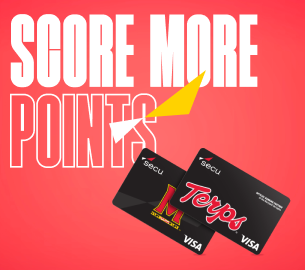About SECU FAQs
Choose a question to see the answer.
Please visit our Contact SECU page for our contact information.
Business hours could vary by location. Visit our Financial Center Locations page for our locations and hours.
Find a convenient Financial Center or surcharge-free ATM near you on our ATM & Financial Center Locations page.
A credit union is a non-profit cooperative institution made up of members who borrow from pooled deposits. Credit unions offer most of the same services as traditional banks but are owned by members not shareholders and are governed by the NCUA.
Credit unions are not-for-profit organizations that are owned by the members of that credit union whereas banks are for-profit institutions owned by shareholders.
For this reason, we are able to pass substantial savings on to our members in comparison with other financial institutions. You could save hundreds – perhaps thousands – of dollars each year by using credit union services as opposed to a commercial bank.
Credit unions are owned by the members of that credit union, while banks are owned by the shareholders. Every credit union member can cast a vote to elect the credit union’s board members, regardless of the amount in their account.
SECU’s routing number is 255076753.
A routing number (also known as a routing transit number or an ABA number) is a nine-digit code used to identify a financial institution. You can find your routing number on the bottom-left corner of your check
A routing number is used to process transactions such as funds transfers, bill payments, check deposits, and direct deposits.
Please find current information on our Careers page.
Check out our eligibility requirements. Once you know you are eligible, all you need is the following information:
- Your Valid government-issued ID (Driver’s License, Passport, Military ID)
- Your Social Security Number
- Your name, address, and date of birth (If your address differs from the address on your ID, we will require proof of address. This can include a change of address card, change of address card from MVA or a utility bill, major credit card bill, phone, electric, cable, water or pay stub (no more than 30 days old) showing current address and members name)
Please use the following mailing address:
-
SECU, Mail Operations
P.O. Box 2172, Glen Burnie, MD 21060
You can also find any of our convenient locations on our Financial Center Locations page.
Credit unions are governed by their Board of Directors, who serve and represent the best interest of the members. Every member, regardless of the amount in their account, can cast a vote to elect the credit union’s board members.
Credit union members receive a number of benefits including:
- Fewer fees
- Lower loan rates
- Potentially higher rates of return on savings accounts
- Personal attention
- Free financial education
- And more!
Unlike Banks and Trusts which are insured by the FDIC, credit unions are insured by the National Credit Union Administration (NCUA). Both institutions insure accounts up to $250,000. The difference is that the NCUA covers regular shares and share draft accounts that are specific to credit unions and the $250,000 coverage limit applies to total deposits at a single institution.
SECU Financial Centers and offices are closed on all federal holidays. Please see the list of 2022 closings below:
- New Years’ Day, Saturday, January 1, 2022
- Dr. Martin Luther King Jr.’s Birthday, Monday, January 17
- Presidents Day, Monday, February 21
- Memorial Day, Monday, May 30
- Juneteenth National Independence Day, Monday, June 20
- Independence Day, Monday, July 4
- Labor Day, Monday, September 5
- Columbus Day, Monday, October 10
- Veteran’s Day, Friday, November 11
- Thanksgiving Day, Thursday, November 24
- Christmas Day, Monday, December 26
Early Closures:
- Christmas Eve and New Year’s Eve: SECU Financial Centers and offices will be open for regular hours and close at 1:00 pm on Christmas Eve and 3:00 pm on New Year’s Eve.
Even if our Financial Centers are closed, you can still conduct transactions anytime with Online Banking or make a withdrawal from one of our ATMs.
